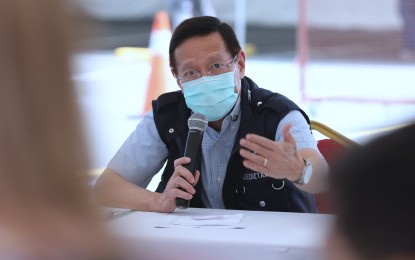
Health Secretary Francisco Duque III. (File photo)
MANILA – Department of Health (DOH) Secretary Francisco Duque III on Wednesday described the year 2020 as the "heaviest part of the department's history because of the coronavirus disease 2019 (Covid-19) pandemic which has put health in the center" following its response to the victims of the Taal Volcano eruption on Jan. 12, 2020.
In an online yearend report, Duque said the DOH has been at the forefront of the whole-of-government and whole-of-society approach to fight Covid-19.
The DOH came out with more than 1,020 issuances in support of the whole-of-government response to Covid-19 and more than 10 joint issuances with other national government agencies
The DOH Health Facility and Services Regulatory Bureau and the Research Institute for Tropical Medicine (RITM) continue to provide technical assistance to laboratories nationwide.
From one laboratory (RITM) in January 20, 2020, it has grown to 199 accredited laboratories, 154 RT-PCR laboratories and 45 GeneXpert laboratories as of December 28, 2020
"Sa simula ng taon ang ating samples ay ipinapadala sa (Early this year, the samples are being brought to the) Victorian Infectious Diseases Reference Laboratory in Melbourne Australia until the tests were done in our National Reference Laboratory at the RITM," Duque said.
The rapid establishment of laboratories and health care provider networks vastly improved case detection and diagnosis.
From 1,282 actual tests per day conducted in the last week of March 2020, the average daily testing output as of Dec. 24, 2020, climbed to 32,150.
The total number of Covid-19 tests conducted as of Dec. 28, 2020, is 6,700,459 with a total of 6,314,493 unique individuals tested which comprises six percent of the country's population.
"With this capacity, our case detection, aggressive isolation and treatment of those who had Covid-19 got faster," Duque said.
To ensure that every Filipino is protected from the threat of Covid-19 and other emerging and re-emerging infectious diseases and health services are closer to home, the DOH with the help of other government agencies and the private sector provided 24,778 beds dedicated for Covid-19 patients in hospitals and 160,024 isolation beds in Isolation and Quarantine Facilities as of December 28, 2020.
The DOH hired 12,733 human resources for health (HRH) and re-deployed 14,789 HRH as of Dec. 18 to different parts of the country to respond to the health care needs of those afflicted by the pandemic.
"We continue to provide appropriate health services to every Filipino through the Telemedicine initiatives where we have six Telemedicine service providers with 179 physicians from Telemedicine partners and 110 physicians and medical student volunteers for Covid-19 hotline doctors and we have provided 73,935 consultations," Duque said.
The Healthy Pilipinas and BIDA Solusyon sa Covid-19 campaigns were launched to bring the right information about Covid-19 to every Filipino so they can make wise and healthy decisions amid the pandemic.
At the 17th Annual Stevie Awards for Women in Business, the Healthy Pilipinas campaign received a bronze award in Best Use of Social Media - Covid-19-related Information category.
The DOH received the highest approval rating of 80 percent among the government agencies on the September 2020 Ulat ng Bayan Report of Pulse Asia Research, Inc.
It also earned a 100 percent awareness rating along with the Department of Education, Department of Education, Department of Social Welfare and Development, and Department of Public Works and Highways.
"We also attained the Performance Governance System Proficiency Level Status, with Silver Trailblazer Award, recognizing the efforts to institutionalize good governance mechanisms by the Institute for Solidarity in Asia. This goes to show that even with the pandemic response the DOH's commitment to good governance continues," Duque said.
Children, elderlies, expecting mothers, and individuals with co-morbidities were also prioritized amid the pandemic.
Under the Sabayang Patak Kontra Polio, about 14.5 million doses were given to children in outbreak-hit and high-risk regions from January to September 2020.
About 1.9 million oral polio vaccine doses were given to children in non-outbreak regions during the Phase 1 Oral Polio Vaccine Supplemental Immunization Activity from Oct. 26 to Nov. 25.
Meanwhile, 4.1 million children received the measles-rubella vaccine during the Phase 1 MR Supplemental Immunization Activity from Oct. 26 to Nov. 25.
The World Health Organization commended the DOH for its coordinated polio outbreak response and supplemental immunization activity against measles and rubella.
For the maternal health program, about 445,249 pregnant women have received antenatal care from January to June 2020.
Some 445,249 pregnant women have undergone facility-based delivery while 451,572 pregnant women were assisted by skilled health professionals during childbirth from January to June 2020.
Through the Maintenance Medicine Access Program, the DOH provided anti-hypertensive drugs to 1,010,173 average hypertensive patients and diabetic medications to 189,104 average diabetic patients from January to October 2020.
Apart from establishing guidelines on the risk-based public health standards for Covid-19, the DOH also ensured the continuity of tuberculosis services amid the pandemic through Department Memorandum No. 2020-0128.
The agency also continued to provide antiretroviral refills for persons with HIV/AIDS with the use of courier services, government vehicles, transport network vehicle services, and home delivery.
"The pandemic showed the need for the implementation of the Universal Healthcare Law (UHC) provisions and it is clear to us that implementing the UHC law and responding to the Covid-19 pandemic are symbiotic. The system that the UHC seeks to strengthen is the same system that responds ably to the pandemic," Duque said.
During the pandemic, the priority areas of the UHC included vaccine delivery strengthening, increasing health service delivery capacity, and institutionalization of the Philippine Center for Disease Control.
Duque urged the public to help in the complete implementation of all the UHC law provisions which started with the government's active response in fighting Covid-19. (PNA)
